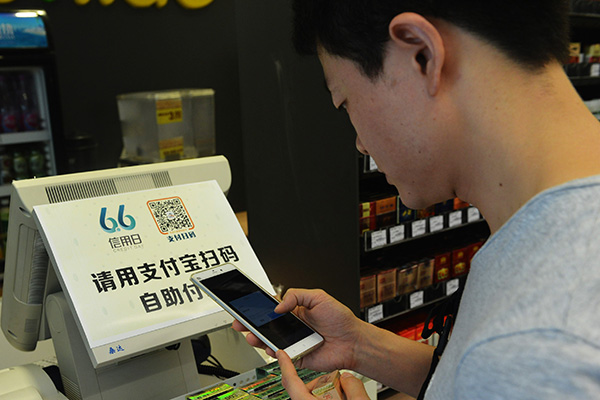Third-party payment risks growing, supervision needed

A man uses his smartphone to scan an Alipay QR code for payments at an unmanned supermarket in Hangzhou, Zhejiang Province. Now that third-party mobile payment is increasingly being used in daily life, scholars have called for upgrading technologies and strengthening supervision mechanism to prevent unlawful acts and secure clients’ funds.
Smartphones have enabled more and more businesses to adopt third-party mobile payment, and platforms like WePay and AliPay are competing to see who can make China go cashless. Though this new mode of payment brings many benefits, scholars warned that steps should be taken to address new risks.
Potential risks
The development of internet finance, e-commerce and mobile technology has driven the rise of third-party mobile payment. With mobile platforms people scan a code to pay for everything from food to clothing and transportation. Mobile platforms have expanded alternative forms of payment to small businesses that once were mostly dealt in cash.
Mobile payment offers consumers convenience while business owners also benefit from improved transaction efficiency, said Hu Haiou, a professor from the Antai College of Economics and Management at Shanghai Jiao Tong University.
Zhao Xijun, deputy director of the School of Finance at Renmin University of China, pointed out potential risks facing third-party payment. Some business owners are refusing to take cash now, which is illegal, Zhao said.
Bad internet connections, mechanical breakdowns and other technological imperfections in the process of payment may lead to transaction failures. Zhao added that some people may take advantage of loopholes to illegally cash in or out, transfer funds and steal personal information records.
In addition, third-party payment platforms may also be inadequately supervised, which will pose a risk to the safety and liquidity of clients’ funds, Zhao said. Some enterprises with an edge in the field may raise fees or compromise service quality once they achieve technological monopoly, damaging the interests of consumers and businesses, he added.
Hu said that mobile payment is an irreversible trend in commercial development. However, he noted that third-party platforms should not be divorced from macroeconomic regulation, and the coverage of China’s credit system still needs to be expanded in various fields.
Comprehensive supervision
Hu suggested strengthening the central bank’s regulatory role while creating monitoring platforms to encourage financial innovation among enterprises. On the whole, Zhao said, it is vital to ensure fair competition by setting unified standards in terms of supervision and taxation for different types of entities.
Also, Zhao suggested seeking new ways to track and identify illegal activities on third-party platforms while also improving security with new technologies. Furthermore, this new mode of payment will require adjustments to monetary policy, he added.
Specifically, Yang Liuyong, deputy director of the School of Economics at Zhejiang University, proposed timely analysis of transaction records and limitations on payment size to enhance security levels and prevent unlawful acts, such as money laundering.

 PRINT
PRINT CLOSE
CLOSE